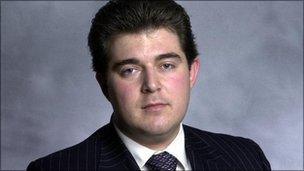MPs fear cuts are leaving rural bus services in crisis
- Published
- comments
The crisis facing the future of bus services in the region has been laid bare by MPs from the east in the House of Commons, external.
The catalyst was a funding shortfall which has left Norfolk County Council, external £4.5m out of pocket, one of the largest shortfalls in the country.
The council has warned that it may not be able to keep subsidising bus travel for the disabled and elderly and that, in turn, could lead to some operators closing services, most likely rural ones.
The cause was taken up by Brandon Lewis, external, the Conservative MP for Great Yarmouth, who secured the debate in Westminster Hall.
Bus budgets
"The coalition government's necessary deficit reduction programme is having a marked effect on the ability to maintain a viable rural transport network," he declared.
Although the main aim of the debate was to call for more funding for Norfolk, Mr Lewis also had some interesting figures on the impact of spending cuts on bus services.

MP Brandon Lewis says rural communities will suffer most with bus service cuts
"Figures requested from local authorities under freedom of information legislation indicate that 74% of local authorities across England have decided to cut their bus budgets over the period 2011-12 to 2013-14," he told the chamber.
"Campaign for Better Transport, external figures show that £36m has already been cut from local authority funding for subsidised bus services, reducing funding across England from 2010-11 to 2011-12.
"In addition, more than 1,000 subsidised bus services have already been cut in the English regions.
"Rural communities will be the ones most affected by the loss of those services, as their Sunday or evening buses will disappear, bus frequency will be reduced and whole routes could disappear."
A number of other MPs from the region also spoke about their fears for the future of rural services.
Subsidised travel
Dr Dan Poulter, the Conservative MP for Central Suffolk, pointed out: "A lot of people who live in more deprived rural environments, particularly older people suffering from fuel poverty, must travel a long way for key services."
Buses were essential for them, he added.
Elizabeth Truss, external (Con, South West Norfolk) admitted: "This is a huge issue in my post bag, as I am sure it is for honourable members across Norfolk."
Brandon Lewis was calling for a better funding formula for subsidising bus travel.
He pointed out that there used to be more than 20 different funding streams for bus travel, something which the new government has reduced to three.
But Mr Lewis believes it favours urban areas at the expense of rural areas.
He called for a system that will "protect rural transport services for the future, and for the use of everybody".
There then followed a debate about how best to run rural bus services.
Many MPs talked about the success of flexibuses.
George Freeman, external (Con, Mid Norfolk) suggested: "If we empower people by giving them the money that we currently spend, we might find that the public, through the big society model, find their own solutions."
But Keith Simpson, external (Con, Broadland) had a word of warning: "In my experience as a Norfolk MP, however, the crucial thing about the local bus service, rather like the local post office, is that people use it or lose it."
Uncertain future
Transport Minister Norman Baker, external praised what he called "a positive and constructive debate".
He assured the house: "Even in these times of austerity measures, the coalition government are firmly committed to protecting the concessionary bus travel scheme.
"The government are aware of how precious the benefit is to older and disabled people. For the avoidance of doubt, the free bus pass is here to stay."
There was just a hint that Norfolk would be getting more money.
Mr Baker admitted that there was a recognition in government "that members in Norfolk have a legitimate concern about the matter, and it is therefore being factored, I think, into the department's thinking".
So more money on the way for Norfolk's buses.
But for all rural services there's still an uncertain future.